2017
N.C. Senators Backed a ‘Tax Cut’ That Will Increase Taxes for Most
![]() Charles Kurzman, “N.C. Senators Backed a ‘Tax Cut’ That Will Increase Taxes for Most,” News & Observer (Raleigh, NC), December 5, 2017. “U.S. Sens. Richard Burr and Thom Tillis just voted to raise North Carolinians’ taxes. The tax-reform bill that they and other Republican senators passed over the weekend will raise taxes on 55 percent of North Carolina households over the coming decade – $900 per household, for a total of $2.2 billion.” More… Data and sources are available in a spreadsheet here.
Charles Kurzman, “N.C. Senators Backed a ‘Tax Cut’ That Will Increase Taxes for Most,” News & Observer (Raleigh, NC), December 5, 2017. “U.S. Sens. Richard Burr and Thom Tillis just voted to raise North Carolinians’ taxes. The tax-reform bill that they and other Republican senators passed over the weekend will raise taxes on 55 percent of North Carolina households over the coming decade – $900 per household, for a total of $2.2 billion.” More… Data and sources are available in a spreadsheet here.
Global Education for All?
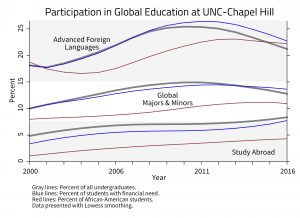 Niklaus Steiner and Charles Kurzman, “Global Education for All?” Center for Global Initiatives, University of North Carolina at Chapel Hill, November 2017. “As global education expands at American colleges and universities, do all of our students have access to these opportunities? Or are we widening the divide between haves and have-nots on our campuses, with students from privileged backgrounds taking advantage of such opportunities, while other students are unable or unwilling to do so? This concern lies at the intersection of two great priorities in American higher education today: global and equity.” More…
Niklaus Steiner and Charles Kurzman, “Global Education for All?” Center for Global Initiatives, University of North Carolina at Chapel Hill, November 2017. “As global education expands at American colleges and universities, do all of our students have access to these opportunities? Or are we widening the divide between haves and have-nots on our campuses, with students from privileged backgrounds taking advantage of such opportunities, while other students are unable or unwilling to do so? This concern lies at the intersection of two great priorities in American higher education today: global and equity.” More…
Scholarly Attention and the Limited Internationalization of US Social Science
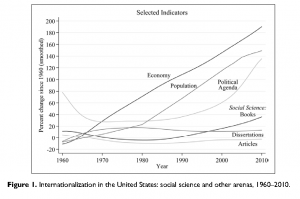 Charles Kurzman, “Scholarly Attention and the Limited Internationalization of US Social Science,” International Sociology, Vol. 32, No. 6, November 2017, pp. 775-795, first posted October 10, 2017. “What parts of the world does American social science consider worthy of scholarly attention? Analyzing the geographic focus of more than 2 million bibliographic records of journal articles, books, and dissertations, the study finds a weak trend toward internationalization of US social-scientific attention over the past half-century.” More…
Charles Kurzman, “Scholarly Attention and the Limited Internationalization of US Social Science,” International Sociology, Vol. 32, No. 6, November 2017, pp. 775-795, first posted October 10, 2017. “What parts of the world does American social science consider worthy of scholarly attention? Analyzing the geographic focus of more than 2 million bibliographic records of journal articles, books, and dissertations, the study finds a weak trend toward internationalization of US social-scientific attention over the past half-century.” More…
Replication data is available at the UNC Data Archive.
The False Premise of Travel Ban 3.0
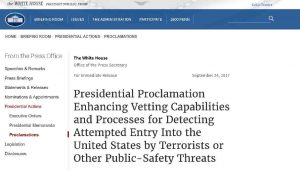 Charles Kurzman, “The False Premise of Travel Ban 3.0,” September 29, 2017. Travel Ban 3.0 is based on the false premise that the security of the United States is threatened by the “inadequate identity-management protocols” of seven countries: Chad, Iran, Libya, North Korea, Syria, Venezuela, and Yemen. The Trump Administration’s third attempt to limit entry to the United States looks more professional than the first two attempts, but the list of countries targeted for the latest travel ban does not match its own criteria. More…
Charles Kurzman, “The False Premise of Travel Ban 3.0,” September 29, 2017. Travel Ban 3.0 is based on the false premise that the security of the United States is threatened by the “inadequate identity-management protocols” of seven countries: Chad, Iran, Libya, North Korea, Syria, Venezuela, and Yemen. The Trump Administration’s third attempt to limit entry to the United States looks more professional than the first two attempts, but the list of countries targeted for the latest travel ban does not match its own criteria. More…
Syria’s Four Revolutions
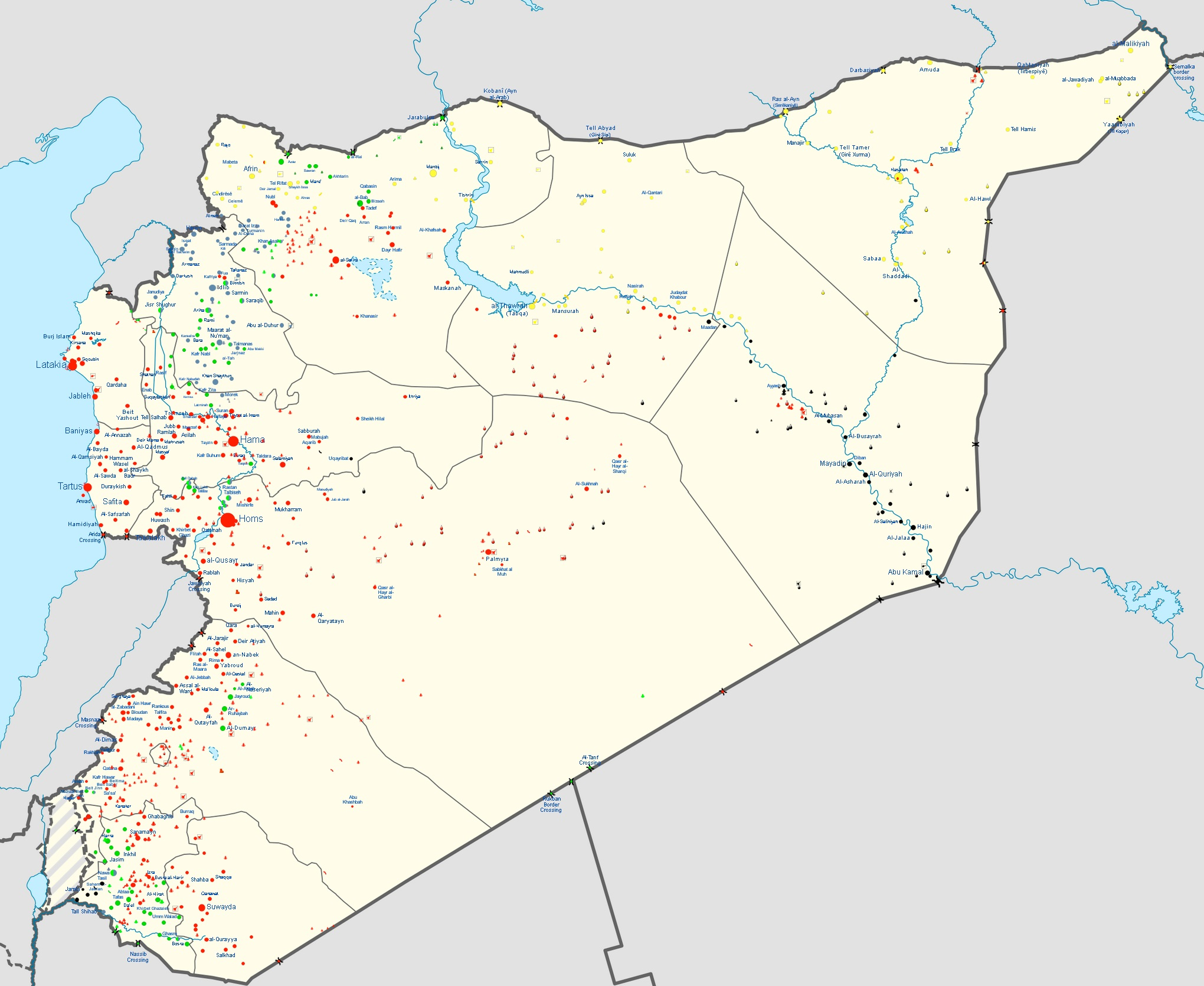 Charles Kurzman, “Syria’s Four Revolutions,” August 31, 2017. Revolutionary upheaval is not uncommon, but it is rare for a country to experience more than one revolution at a time, and almost unprecedented to have four revolutions going at once. That’s what Syria is going through — four distinct revolutionary movements and a brutal government have shattered Syria into bloody shards, with hundreds of thousands of fatalities, millions of refugees, and millions more displaced and suffering. More…
Charles Kurzman, “Syria’s Four Revolutions,” August 31, 2017. Revolutionary upheaval is not uncommon, but it is rare for a country to experience more than one revolution at a time, and almost unprecedented to have four revolutions going at once. That’s what Syria is going through — four distinct revolutionary movements and a brutal government have shattered Syria into bloody shards, with hundreds of thousands of fatalities, millions of refugees, and millions more displaced and suffering. More…
Understanding the U.S. and Iran
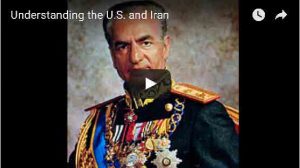 Charles Kurzman, “Understanding the U.S. and Iran,” Duke-UNC Consortium for Middle East Studies video series, “Middle East Explained,” March 15, 2017 (released July 10, 2017). “In this video, University of North Carolina-Chapel Hill Professor of Sociology Charles Kurzman recounts the often untold history of American-Iranian relations. Although Iran is often on the news as a problem for the United States, much of Iran’s pre-1979 Revolution history is not considered; Kurzman puts the current issues in historical context.” More…
Charles Kurzman, “Understanding the U.S. and Iran,” Duke-UNC Consortium for Middle East Studies video series, “Middle East Explained,” March 15, 2017 (released July 10, 2017). “In this video, University of North Carolina-Chapel Hill Professor of Sociology Charles Kurzman recounts the often untold history of American-Iranian relations. Although Iran is often on the news as a problem for the United States, much of Iran’s pre-1979 Revolution history is not considered; Kurzman puts the current issues in historical context.” More…
Teaching the Middle East in 10 Quiz Questions
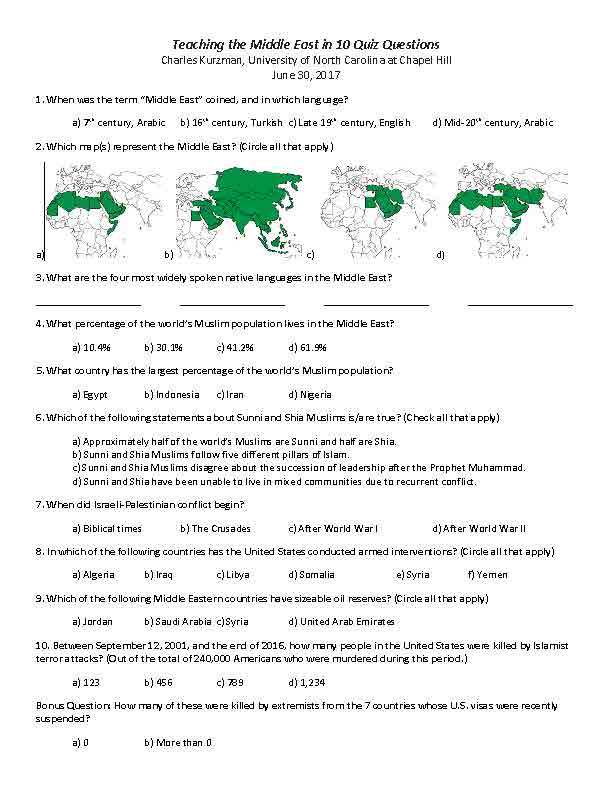 Charles Kurzman, “Teaching the Middle East in 10 Quiz Questions,” June 30, 2017. If you’re teaching social studies or world history or current events, your students may be curious about the Middle East. The region seems to be unavoidable in global public debate. Here’s a quick quiz to help you teach about the Middle East, whether or not you consider yourself an expert. More…
Charles Kurzman, “Teaching the Middle East in 10 Quiz Questions,” June 30, 2017. If you’re teaching social studies or world history or current events, your students may be curious about the Middle East. The region seems to be unavoidable in global public debate. Here’s a quick quiz to help you teach about the Middle East, whether or not you consider yourself an expert. More…
GOP Assault on Health Insurance, North Carolina Style
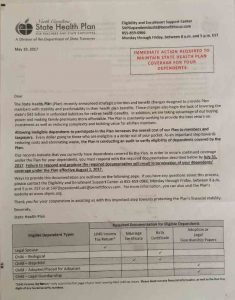 Charles Kurzman, “The GOP Assault on Health Insurance, North Carolina Style,” News & Observer (Raleigh, NC), May 30, 2017. “I got a letter recently from the office of State Treasurer Dale Folwell threatening to take away my children’s health insurance. So did everyone else who works for the State of North Carolina.” More…
Charles Kurzman, “The GOP Assault on Health Insurance, North Carolina Style,” News & Observer (Raleigh, NC), May 30, 2017. “I got a letter recently from the office of State Treasurer Dale Folwell threatening to take away my children’s health insurance. So did everyone else who works for the State of North Carolina.” More…
Ideology and Threat Assessment
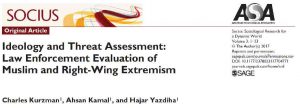 Charles Kurzman, Ahsan Kamal, and Hajar Yazdiha, “Ideology and Threat Assessment: Law Enforcement Evaluation of Muslim and Right-Wing Extremism,” Socius, Vol. 3, April 18, 2017. “Does ideology affect assessment of the threat of violent extremism? A survey of law enforcement agencies in the United States in 2014 offers a comparison suggesting a small but statistically significant effect: Political attitudes were correlated with assessment of threats posed by Muslim extremists, and threat assessment was not correlated with the number of Muslim Americans who had engaged in violent extremism within the agency’s jurisdiction. By contrast, the perceived threat of right-wing terrorism was correlated with the number of incidents of right-wing violence and not with political attitudes.” More… Survey data available at ICPSR.
Charles Kurzman, Ahsan Kamal, and Hajar Yazdiha, “Ideology and Threat Assessment: Law Enforcement Evaluation of Muslim and Right-Wing Extremism,” Socius, Vol. 3, April 18, 2017. “Does ideology affect assessment of the threat of violent extremism? A survey of law enforcement agencies in the United States in 2014 offers a comparison suggesting a small but statistically significant effect: Political attitudes were correlated with assessment of threats posed by Muslim extremists, and threat assessment was not correlated with the number of Muslim Americans who had engaged in violent extremism within the agency’s jurisdiction. By contrast, the perceived threat of right-wing terrorism was correlated with the number of incidents of right-wing violence and not with political attitudes.” More… Survey data available at ICPSR.
Coverage in The New York Times, November 3, 2018.
Trump’s Muslim Laptop Ban
 Charles Kurzman, “Trump’s Muslim Laptop Ban,” Politico, April 4, 2017. “Every day, dozens of airplanes arrive in the United States from 10 Muslim-majority countries. All of these countries are active partners in the coalition against the self-proclaimed Islamic State. All of them sent senior officials to Washington last month to coordinate the next phase in this struggle. The day before the coalition met, the Trump administration announced that no direct flights from eight of these 10 Muslim-majority countries to the United States could allow passengers to sit with their laptops and tablets. This was a slap at security officials in these countries, at the very moment that the United States was asking them for additional help in fighting terrorism.” More…
Charles Kurzman, “Trump’s Muslim Laptop Ban,” Politico, April 4, 2017. “Every day, dozens of airplanes arrive in the United States from 10 Muslim-majority countries. All of these countries are active partners in the coalition against the self-proclaimed Islamic State. All of them sent senior officials to Washington last month to coordinate the next phase in this struggle. The day before the coalition met, the Trump administration announced that no direct flights from eight of these 10 Muslim-majority countries to the United States could allow passengers to sit with their laptops and tablets. This was a slap at security officials in these countries, at the very moment that the United States was asking them for additional help in fighting terrorism.” More…
Was the Arab Spring Worth It?
![]() Charles Kurzman, “Was the Arab Spring Worth It?” Mobilizing Ideas, March 1, 2017. “You risked your life for freedom, dignity, justice, and equality. You took days and weeks from other responsibilities – from your family, your school, your work — in order to serve your nation. You convinced yourself that you were building a better future. Now you ask yourself, was it worth it?” More…
Charles Kurzman, “Was the Arab Spring Worth It?” Mobilizing Ideas, March 1, 2017. “You risked your life for freedom, dignity, justice, and equality. You took days and weeks from other responsibilities – from your family, your school, your work — in order to serve your nation. You convinced yourself that you were building a better future. Now you ask yourself, was it worth it?” More…
Muslim-American Involvement with Violent Extremism, 2016
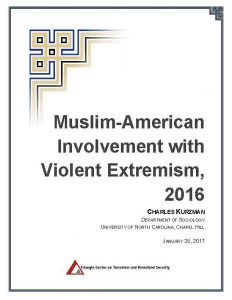 Charles Kurzman, “Muslim-American Involvement with Violent Extremism, 2016,” January 26, 2017. The number of Muslim-Americans associated with violent extremism dropped 40 percent in 2016, as compared with the previous year, although this drop was overshadowed by the mass shooting in Orlando, Florida, in June 2016. Only 20 percent of these individuals had family backgrounds in one of the seven Muslim-majority countries reportedly designated for immigrant bans by the Trump administration. There have been no fatalities in the U.S. since 9/11 caused by extremists from these countries. More…
Charles Kurzman, “Muslim-American Involvement with Violent Extremism, 2016,” January 26, 2017. The number of Muslim-Americans associated with violent extremism dropped 40 percent in 2016, as compared with the previous year, although this drop was overshadowed by the mass shooting in Orlando, Florida, in June 2016. Only 20 percent of these individuals had family backgrounds in one of the seven Muslim-majority countries reportedly designated for immigrant bans by the Trump administration. There have been no fatalities in the U.S. since 9/11 caused by extremists from these countries. More…
Charles Kurzman, “These Numbers Show Why Trump’s Muslim Entry Limit Is Absurd,” Huffington Post, January 26, 2017.
Coverage by National Public Radio, January 27, 2017; The New York Times, January 28, 2017; The Washington Post, January 28, 2017; The Washington Post, February 7, 2017; The Wall Street Journal, February 10, 2017.
In 2016, Americans were less likely to be killed by Muslim extremists (1 in six million) than for being Muslim (one in one million): 54 fatalities in a population of approximately 324 million vs. 4 fatalities (Khalid Jabara in Tulsa and Imam Maulama Akonjee, Thara Uddin, and Nazma Khanam in New York) in a population of approximately 3 million. Update of 2015 data; coverage by Nicholas Kristof, The New York Times, February 12, 2017.
Examine the data for yourself here.
Previous annual reports on Muslim-American involvement with violent extremism are available here.